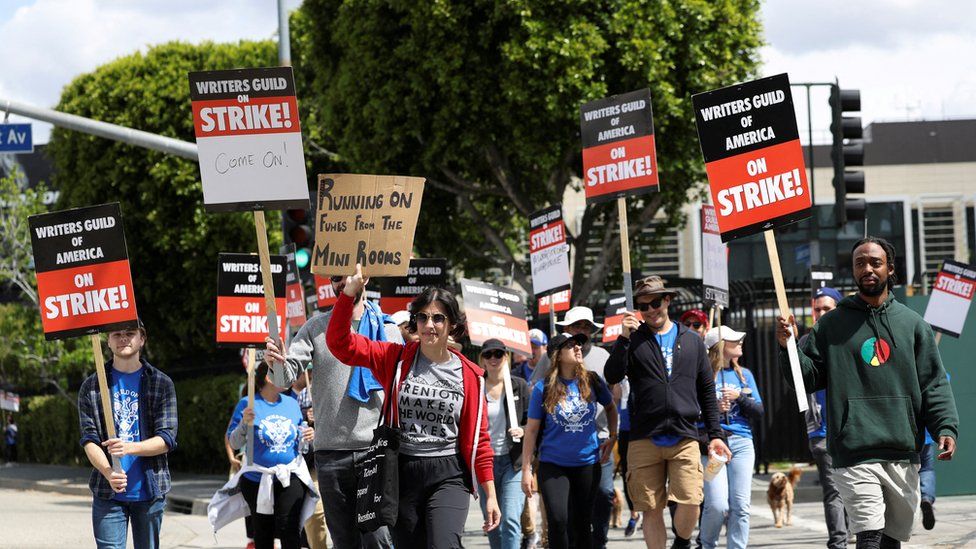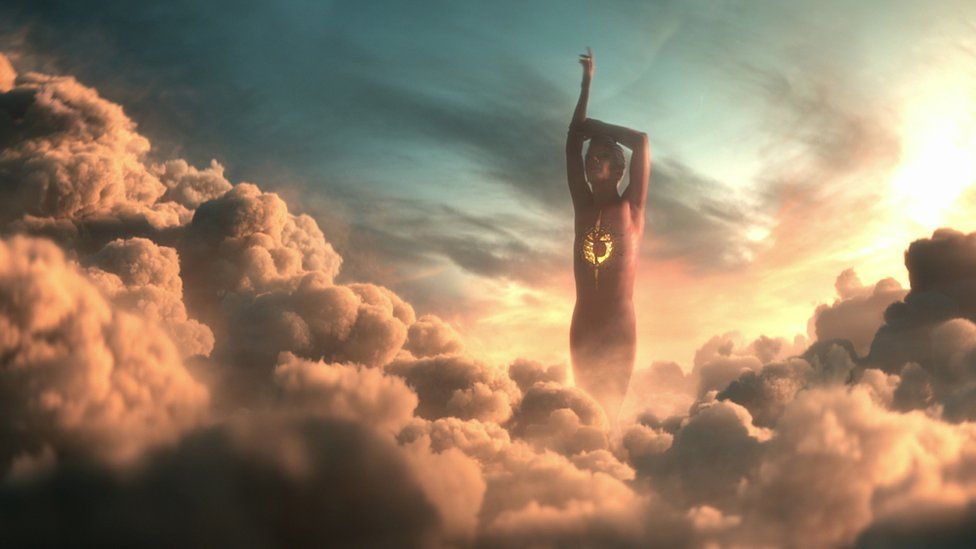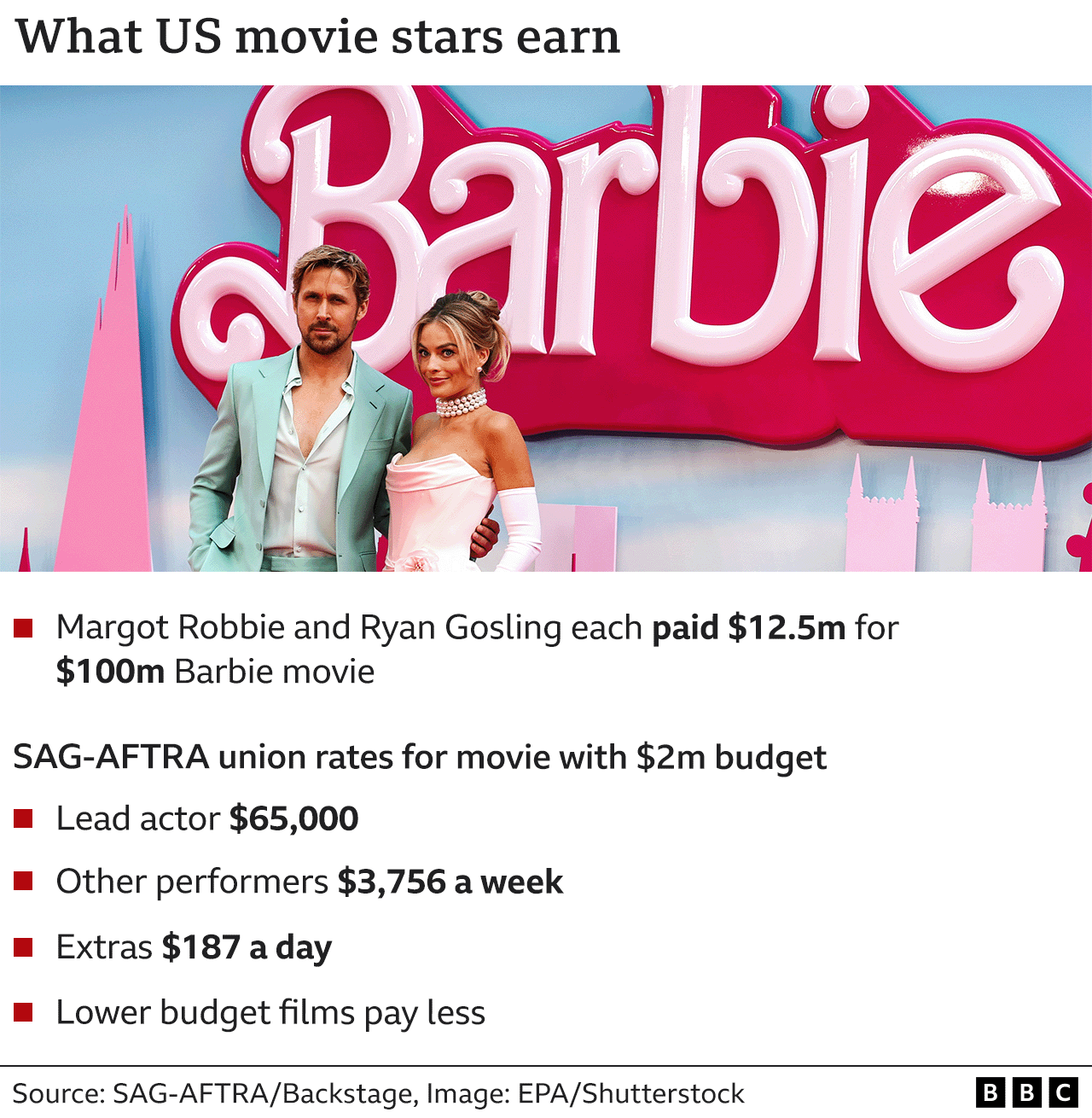STRIKE: Actors Walk Out of The Set of Avatar and Gladiator Sequels
Major films in production including the Avatar and Gladiator sequels are looking likely to be affected by Hollywood actors taking strike action. Promotional events such as red-carpet premieres will...

Major films in production including the Avatar and Gladiator sequels are looking likely to be affected by Hollywood actors taking strike action.
Promotional events such as red-carpet premieres will also be affected, such as Disney film Haunted Mansion, released later this month.
Events including the Emmys and Comic-Con may be rescheduled or scaled back.
In the industry’s biggest shutdown for over 60 years, some 160,000 performers stopped work at midnight in LA.
Picketing will begin on Friday morning outside the California headquarters of Netflix, before moving on to Paramount, Warner Bros and Disney.
The announcement of the strike followed similar strike action from the Writers Guild of America (WGA), and brought most US film and TV productions to a halt.
The Screen Actors Guild (SAG) wants streaming giants to agree to a fairer split of profits and better working conditions.
It also wants to protect actors from being usurped by digital replicas.
The union is seeking guarantees that artificial intelligence (AI) and computer-generated faces and voices will not be used to replace actors.
While the strike lasts, actors cannot appear in films or even promote movies that they have already made.
Other productions which may be affected include Deadpool 3, starring Ryan Reynolds and Hugh Jackman, along with Tim Burton’s Beetlejuice sequel and a film adaptation of the musical Wicked.

It is also possible that HBO’s House of the Dragon TV series may be hit by the strike, along with the second series of Netflix’s The Sandman and Family Guy and The Simpsons on Fox.
US networks have responded by expanding the amount of “unscripted content”, like The Masked Singer, The Amazing Race, Survivor and Kitchen Nightmares, in their autumn schedules.
Phil Clapp, the chief executive of the UK Cinema Association, told BBC News he did not think the strike would cause too much disruption for cinema-goers.
“Given the challenges UK cinema operators have faced in the last few years, all will be concerned by anything which might potentially threaten the supply of films to the big screen, and so it is very much hoped that there will be a quick resolution to the current dispute,” he said.
“That said, there is already a strong slate of films locked in for the weeks and months to come, starting with Mission Impossible: Dead Reckoning Part One, Barbie and Oppenheimer all in, or coming to cinemas very soon and – with other major titles stretching into 2024 – promising to entertain millions of cinema-goers.
“Unless the current strike is a protracted one, we are confident that cinemas we will see little if any disruption in the foreseeable future.”
Actors Cillian Murphy, Matt Damon and Emily Blunt left the premiere of Christopher Nolan’s Oppenheimer in London on Thursday night as the strike was declared.
The film’s director, Christopher Nolan, told the cinema audience that they were “off to write their picket signs”, adding that he supported them in their struggle.
For films in production, the strike means a large portion of work will become impossible. Even in cases in which filming has already been completed, actors will be unavailable for re-shoots and other essential elements of the filmmaking process.
TV shows that are still being filmed will also largely have to stop, although in some cases side deals could be struck between performers and producers to allow work to continue.
Several actors took to Instagram to voice their support for the strike, including Better Call Saul star Bob Odenkirk, Sex and the City’s Cynthia Nixon and Hollywood veteran Jamie Lee Curtis.
To address concerns about the use of AI, the big studios have offered what they call a “ground-breaking proposal” that would protect the digital likeness of actors and require their consent when digital replicas are used in performances, or alterations are made.
But the union rejected the offer, made by the Alliance of Motion Picture and Television Producers (AMPTP).
The SAG’s national executive director and chief negotiator, Duncan Crabtree-Ireland, said it was unacceptable.
“They propose that our background performers should be able to be scanned, get paid for one day’s pay, and their company should own that scan of their image, their likeness, and should be able to use it for the rest of eternity,” he said. “If you think that’s a ground-breaking proposal, I suggest you think again.”
The AMPTP said the strike was “certainly not the outcome we hoped for as studios cannot operate without the performers that bring our TV shows and films to life”.
“The union has regrettably chosen a path that will lead to financial hardship for countless thousands of people who depend on the industry,” its statement added.
The union is officially known as the Screen Actors Guild-American Federation of Television and Radio Artists, or SAG-AFTRA.
Another of its demands of the streaming services is that actors should receive greater base pay and residuals – meaning payments made to actors from repeats of films and programmes they’ve starred in.
The strike includes tens of thousands of actors who receive significantly less pay for minor parts than their A-list colleagues.

“In the old model, they get residuals based on success,” Kim Masters, the editor-in-chief of the Hollywood Reporter, told the BBC. “In the new model, they don’t get to find out what’s going on behind the scenes, because the streamers don’t share.”
Fran Drescher, SAG’s president, said the strike came at a “very seminal moment” for actors in the industry.
“What’s happening to us is happening across all fields of labour,” she said, “when employers make Wall Street and greed their priority, and they forget about the essential contributors that make the machine run.”
The actors’ strike could move across the Atlantic if US production companies shift filming to the UK because of the industrial action taken by their American counterparts, British union Equity said on Friday.
The body, which represents more than 47,000 performers in the UK, says the union stands in solidarity with US actors who are striking.
Equity – which is not striking – told US companies it will be keeping a “very close eye” on any attempts to move productions to the UK due to the action called on Thursday evening.
A separate strike by the 11,500 members of the Writers Guild of America demanding better pay and working conditions has been going since 2 May.
Some writers have turned to projects that are not covered by the contract between the guild and the Alliance of Motion Picture and Television Producers.
The “double strike” by both unions is the first since 1960, when the SAG was led by actor Ronald Reagan, long before he entered politics and became US president. The last strike by actors took place in 1980.
Speaking during a gathering of industry leaders at an Idaho resort ahead of the SAG’s announcement on Thursday, Disney chief executive Bob Iger said the demands of both actors and writers were impractical and damaging to an industry still recovering from the pandemic.
“It’s very disturbing to me,” Mr Iger said. “This is the worst time in the world to add to that disruption.”
A third union, the Directors Guild of America, successfully negotiated a contract in June and will not participate.
BBC









No Comment! Be the first one.